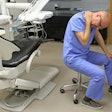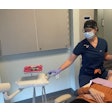Mental health services appear to be underutilized despite depression among survivors of head and neck cancer (HNC), according to a new study in JAMA Otolaryngology -- Head & Neck Surgery (August 15, 2013).
The long-term physical effects of radiation therapy for HNC have been well-described, but few studies have examined psychosocial functioning, including depression, among patients, according to the study authors, from the University of California, Davis and the University of California, Los Angeles.
They examined the prevalence of self-reported depression among survivors of HNC during follow-up after radiation therapy. The study included 211 patients with squamous cell carcinoma of the head and neck who had been treated and were disease-free with at least one year of follow-up. A questionnaire was used to analyze rates of depression.
The proportion of patients who reported their mood as "somewhat depressed" or "extremely depressed" was 17%, 15%, and 13% at one, three, and five years, respectively.
However, among the patients who reported their mood as either "somewhat depressed" or "extremely depressed" at one, three and five years, the proportion of patients using antidepressants was 6%, 11%, and 0%, respectively. The proportion of patients actively undergoing or seeking psychotherapy and/or counseling was 3%, 6%, and 0%, respectively, according to study results.
"Despite a relatively high rate of depression among patients with head and neck cancer in the postradiation therapy setting, mental health services are severely underutilized," the study authors concluded.



















